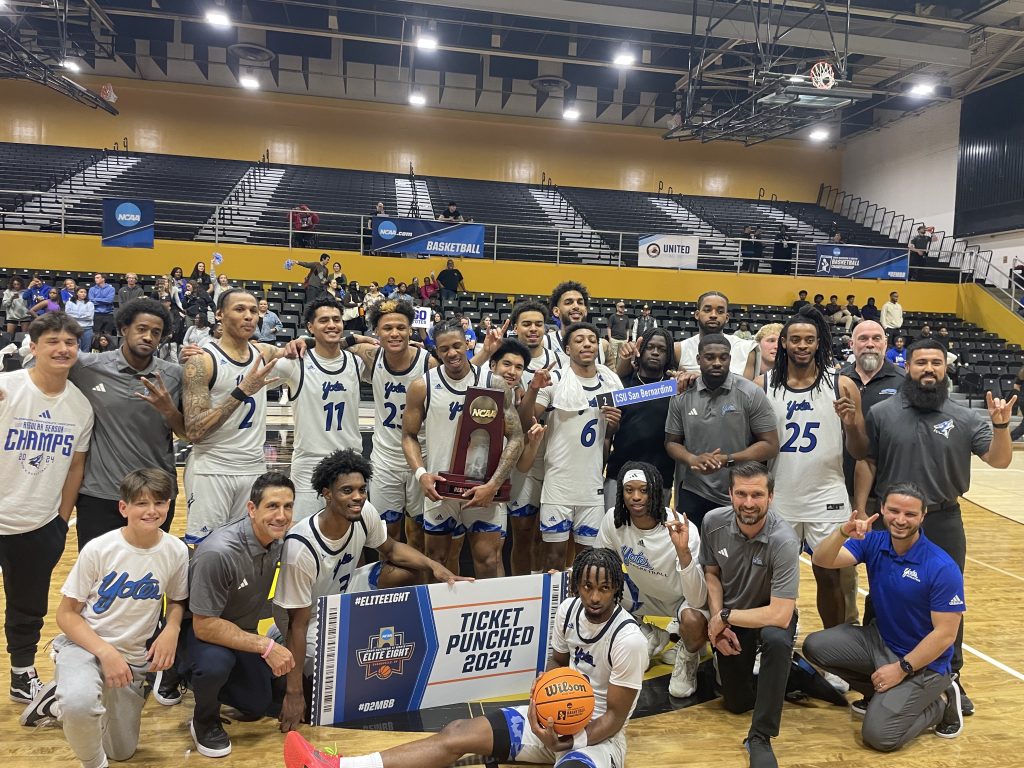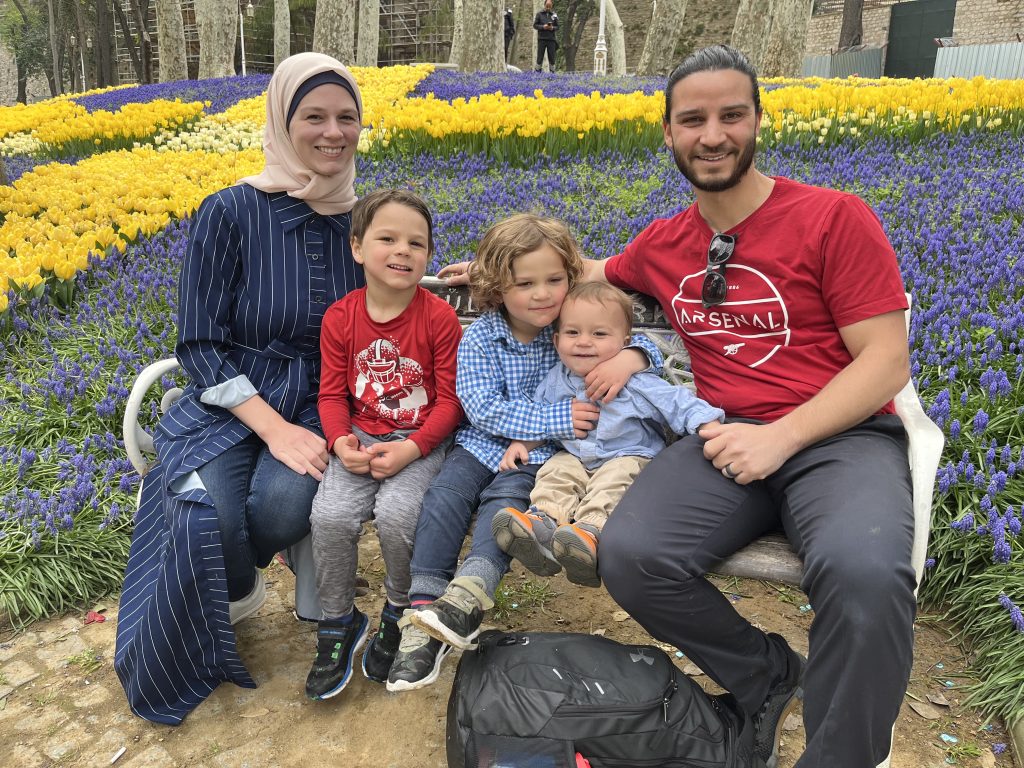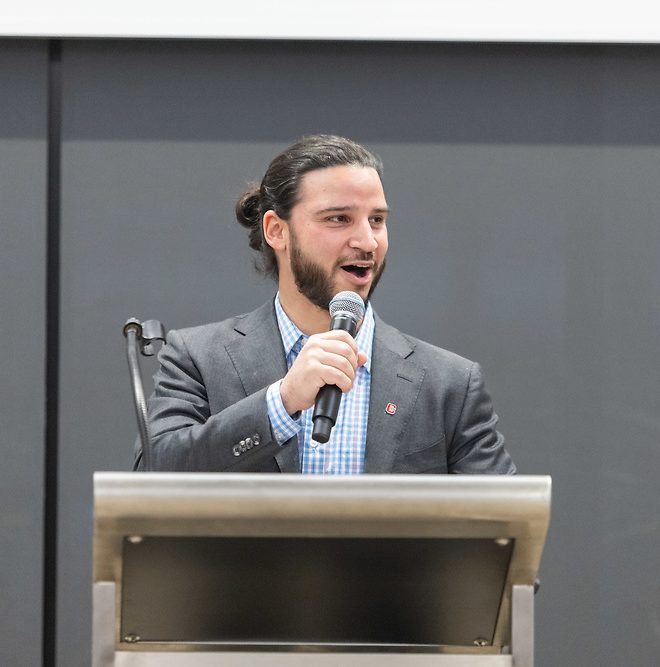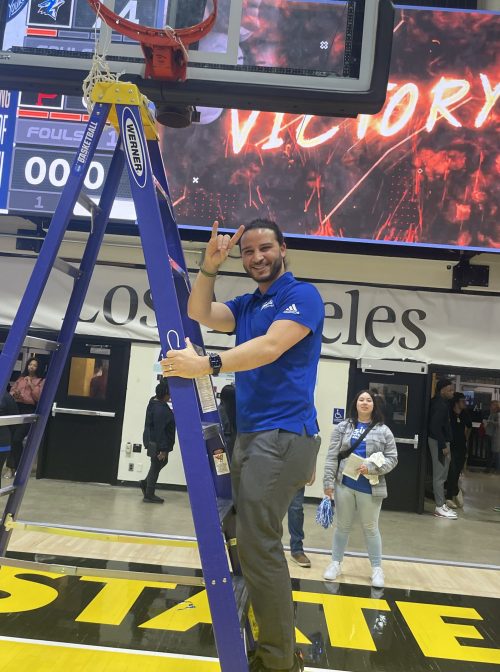Halfway through Islam’s holy month of Ramadan, Shareef Amer, 36, sits in a hotel room, wearing a California State University San Bernardino (CSUSB) Coyotes shirt.
He has expressive eyes, a warm, frequent smile, and black, flowing hair pulled back into a low bun. Amer is in Evansville, Ind., as athletic director of CSUSB, whose men’s basketball team is playing for the NCAA Division II Championship.
“This blessed month is so important to us,” Amer said of being Muslim in collegiate athletics. “We also have aspirations to compete at the highest level.”
During Ramadan, Muslims fast from sunrise to sunset, which Amer has done since childhood. He has only made it to the mosque once over the first two weeks but made a massive dent in his Quran rereading during the long trip to Evansville, which included five hours of flying and a one-hour layover. Amer peered out his window to ensure the sun had set, broke his fast with a Clif Bar and Vitamin Water, and prayed. After arriving at the hotel at nearly 1 a.m., he woke up at 4:45 a.m. to prepare for a day of fasting with some sustenance and recite the Fajr prayer at sunrise. Too excited, Amer stayed awake for the team’s practice at 8 a.m.

He is in his first year as athletic director after five years with Cal State Northridge and prior stints at the University of Southern California and the University of Michigan. Although Amer’s Coyotes have zero student-athletes observing Ramadan, at CSUN, he worked closely with the department’s nutritionist to ensure support for those fasting by creating an alternative fueling plan. The nutritionist devised “Ramadan snack bags” that student-athletes picked up to help them refuel after sunset, and the department covered the cost. The bags included a protein shake, dates, trail mix, dried fruit bars, and a Gatorade and cost $4.68 per athlete each day, thanks to Costco bulk pricing.
A competitive athlete himself—Amer competed in the Illinois state soccer championship as a Buffalo Grove High School junior in suburban Chicago— he, too, was often the only Muslim on his team.
The purpose of fasting is to exercise and thus enhance one’s willpower. We control our urges and can assume control of our lower self by retraining our bodies annually.
“But as a 16- or 17-year-old trying to play a 90-minute soccer game, the mental part starts messing with you,” Amer said. “If you make a bad play, you start to consider if it’s because you’re fasting. But you can also go, ‘OK, I have to rise to the occasion.’ You see athletes respond in different ways.”
Amer recalls Ramadan beginning during CSUN men’s basketball’s 2019 conference tournament and freshman Lamine Diane needing support. He was from Senegal, fasting away from his family and in a country that was not predominantly Muslim for the first time. With Amer’s support, Diane recorded 22 points, 17 rebounds, five blocks, four assists, and three steals in the tournament opener.
“For very physically demanding sports like basketball and track and field, it’s good for student-athletes to know they have a dedicated professional who will help them balance what they are trying to achieve,” he said.
When Amer was a kid, international sports weren’t accessible to follow. Now, his three young sons regularly watch Egyptian soccer player Mohamed Salah, who plays for Liverpool in the Premier League.
“I definitely think that it’s impactful, and my kids notice it,” Amer said. “When they watch Salah’s goal celebration where he puts his head on the ground and thanks God, that’s how we pray. So, they see themselves in him. When they see him performing at such a high level, I think they know they can do it, too. The more examples like that, the better.”
Amer is one of very few high-ranking Muslims in athletic administration or coaching. In fact, Cal State San Marcos Interim Athletic Director Morod Shah is the only example he can name. For Amer, increasing diversity in this realm hinges on beginning the cycle early.

“It starts with Muslim kids being able to play and have access to sports and have an understanding that they can continue this in college,” Amer said. “A lot of Muslims are children of immigrants, and the idea of college athletics is unique to the U.S.”
Amer had to explain his job to his Egyptian-born parents, who didn’t quite understand it.
Half-Egyptian but not Muslim, Magdi El Shahawy was instrumental in Amer’s journey; he was USC’s Senior Associate Athletic Director when Amer started with the Trojans.
“As soon as I saw him, I believed I could do this,” Amer said. “There’s someone I can relate to who is doing this at an incredibly high level.”
A pivotal moment for Amer occurred when he was selected for Michigan Athletics’ DEI committee. He wasn’t expecting to be chosen as a compliance officer, although he was somewhat low in the hierarchy for many committees. The first email announced the weekly meeting would occur at the same time as the Friday Jum’ah prayer. Since Amer is a fixture at the mosque from 1 to 2 p.m. on Fridays as an observant Muslim, he responded by explaining his religious needs and asking for a different time. The leadership accommodated him, and they learned something new about Islam due to Amer’s self-advocacy.
“That’s my meeting with God,” Amer said. “That trumps everything.”
Networking without drinking alcohol, a practice forbidden in Islam, has presented a challenge.
“How can I build a relationship with someone I might want to hire for a coaching job someday without grabbing drinks with them after a game,” Amer asked.
For Amer, being a Muslim keeps him grounded and imbues him with a values system.

“When faced with new challenges, I’m more tethered,” Amer said. “I have a sense of identity.”
It also allows him to connect with other Muslims, an “underrepresented group in college athletics,” and provides a recruiting advantage.
“Say it’s between us and another school for this kid from Qatar,” Amer said, “If he knows there’s a Muslim here who can tell him where the mosque is and invite him over for Ramadan meals, maybe that’s the difference-maker.”
He believes human connection will create an inclusive, diverse environment in collegiate athletics.
This means “interacting with individuals less as the label they happen to be and more as ‘That’s just my friend, and I know them as having this background, that makes them a better person, and I love them for it.'”
As leader of his department, Amer plans to bring enough baklava to the office so everyone can “get a taste of the culture.”
He was so busy with work that he missed the iftar, the meal where Muslims break the fast, twice last week.
“It’s like waking up on Christmas morning and opening up your presents a half-hour later than your siblings,” Amer said.
Still, he knows how good he has it.
“I’m really grateful to be able to fast and be in a place where we can talk about it,” Amer said. “A lot of people in the world today can’t. And I’m fortunate to do it for my first time as an athletic director.”
Joshua Jonah Fischman is a Los Angeles-based athletic communications professional who has performed media and public relations for the Los Angeles Angels and Chargers, Chicago Sky and Bulls. He has also served as Athletic Communications Director for Whittier College and worked for the Los Angeles Dodgers. As a journalist for Just Women’s Sports, he explored the intersection of sports and social issues, covering the L.A. Sparks and Angel City Football Club. The 16-year sports media veteran received his undergraduate degree from the University of Southern California and his master’s in Journalism from Northwestern University’s Medill School of Journalism.
X: @SportsCommsJosh




